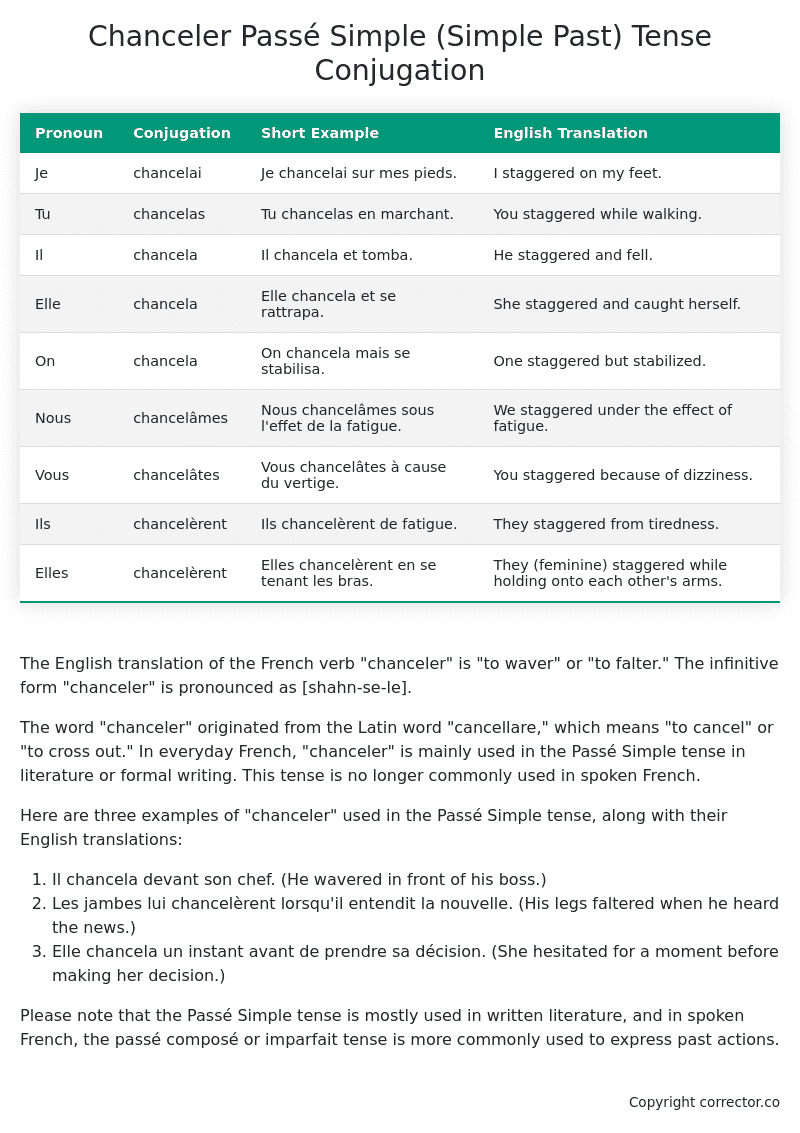Passé Simple (Simple Past) Tense Conjugation of the French Verb chanceler
Introduction to the verb chanceler
The English translation of the French verb “chanceler” is “to waver” or “to falter.” The infinitive form “chanceler” is pronounced as [shahn-se-le].
The word “chanceler” originated from the Latin word “cancellare,” which means “to cancel” or “to cross out.” In everyday French, “chanceler” is mainly used in the Passé Simple tense in literature or formal writing. This tense is no longer commonly used in spoken French.
Here are three examples of “chanceler” used in the Passé Simple tense, along with their English translations:
- Il chancela devant son chef.
(He wavered in front of his boss.) - Les jambes lui chancelèrent lorsqu’il entendit la nouvelle.
(His legs faltered when he heard the news.) - Elle chancela un instant avant de prendre sa décision.
(She hesitated for a moment before making her decision.)
Please note that the Passé Simple tense is mostly used in written literature, and in spoken French, the passé composé or imparfait tense is more commonly used to express past actions.
Table of the Passé Simple (Simple Past) Tense Conjugation of chanceler
| Pronoun | Conjugation | Short Example | English Translation |
|---|---|---|---|
| Je | chancelai | Je chancelai sur mes pieds. | I staggered on my feet. |
| Tu | chancelas | Tu chancelas en marchant. | You staggered while walking. |
| Il | chancela | Il chancela et tomba. | He staggered and fell. |
| Elle | chancela | Elle chancela et se rattrapa. | She staggered and caught herself. |
| On | chancela | On chancela mais se stabilisa. | One staggered but stabilized. |
| Nous | chancelâmes | Nous chancelâmes sous l’effet de la fatigue. | We staggered under the effect of fatigue. |
| Vous | chancelâtes | Vous chancelâtes à cause du vertige. | You staggered because of dizziness. |
| Ils | chancelèrent | Ils chancelèrent de fatigue. | They staggered from tiredness. |
| Elles | chancelèrent | Elles chancelèrent en se tenant les bras. | They (feminine) staggered while holding onto each other’s arms. |
Other Conjugations for Chanceler.
Le Present (Present Tense) Conjugation of the French Verb chanceler
Imparfait (Imperfect) Tense Conjugation of the French Verb chanceler
Passé Simple (Simple Past) Tense Conjugation of the French Verb chanceler (You’re reading it right now!)
Passé Composé (Present Perfect) Tense Conjugation of the French Verb chanceler
Futur Simple (Simple Future) Tense Conjugation of the French Verb chanceler
Futur Proche (Near Future) Tense Conjugation of the French Verb chanceler
Plus-que-parfait (Pluperfect) Tense Conjugation of the French Verb chanceler
Passé Antérieur (Past Anterior) Tense Conjugation of the French Verb chanceler
Futur Antérieur (Future Anterior) Tense Conjugation of the French Verb chanceler
Subjonctif Présent (Subjunctive Present) Tense Conjugation of the French Verb chanceler
Subjonctif Passé (Subjunctive Past) Tense Conjugation of the French Verb chanceler
Subjonctif Imparfait (Subjunctive Imperfect) Tense Conjugation of the French Verb chanceler
Subjonctif Plus-que-parfait (Subjunctive Pluperfect) Tense Conjugation of the French Verb chanceler
Conditionnel Présent (Conditional Present) Tense Conjugation of the French Verb chanceler
Conditionnel Passé (Conditional Past) Tense Conjugation of the French Verb chanceler
Conditionnel Passé II (Conditional Past II) Tense Conjugation of the French Verb chanceler
L’impératif Présent (Imperative Present) Tense Conjugation of the French Verb chanceler
L’impératif Passé (Imperative Past) Tense Conjugation of the French Verb chanceler
L’infinitif Présent (Infinitive Present) Tense Conjugation of the French Verb chanceler
L’infinitif Passé (Infinitive Past) Tense Conjugation of the French Verb chanceler
Le Participe Présent (Present Participle) Tense Conjugation of the French Verb chanceler
Le Participe Passé (Past Participle) Tense Conjugation of the French Verb chanceler
Struggling with French verbs or the language in general? Why not use our free French Grammar Checker – no registration required!
Get a FREE Download Study Sheet of this Conjugation 🔥
Simply right click the image below, click “save image” and get your free reference for the chanceler Passé Simple tense conjugation!

Chanceler – About the French Passé Simple (Simple Past) Tense
Formation
Usage
Narration
Historical Context
Interactions with other tenses
Passé Composé
Imparfait
Conditional and Subjunctive
Summary
I hope you enjoyed this article on the verb chanceler. Still in a learning mood? Check out another TOTALLY random French verb conjugation!


